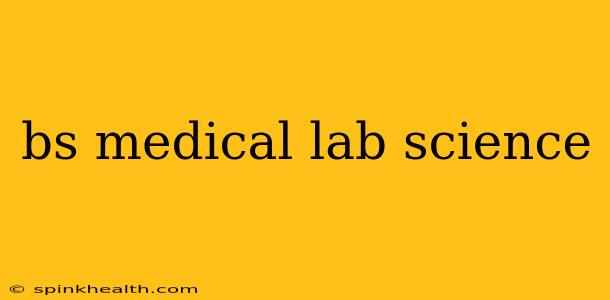Decoding the World of BS Medical Laboratory Science: A Journey into the Heart of Diagnostics
The world of healthcare is a vast and intricate tapestry, and woven within its threads are the skilled individuals who work tirelessly behind the scenes: medical laboratory scientists. Many aspiring professionals embark on this path by pursuing a Bachelor of Science (BS) in Medical Laboratory Science (MLS). But what exactly does this degree entail, and what exciting career opportunities await graduates? This isn't just another career path; it's a story of precision, dedication, and the profound impact of accurate diagnostics.
My own journey into the world of medical laboratory science began with a fascination for the unseen – the microscopic battles waged within the human body. I was captivated by the idea that a single drop of blood, a tiny tissue sample, could hold the key to unlocking a diagnosis, potentially saving a life. That's the power of medical laboratory science. This blog post is born from that fascination and a desire to share the insights I’ve gathered over the years.
What is a BS in Medical Laboratory Science?
A BS in Medical Laboratory Science is a rigorous undergraduate program that equips students with the theoretical knowledge and hands-on skills necessary to perform a wide range of laboratory tests. The curriculum covers various disciplines, including:
- Hematology: The study of blood and blood-forming tissues. Think about those complete blood counts (CBCs) – the backbone of many diagnoses. Imagine meticulously analyzing blood smears, identifying different cell types, and detecting anomalies that could signal a serious illness.
- Clinical Chemistry: The analysis of bodily fluids like blood and urine to measure the levels of various chemicals. This involves sophisticated instrumentation and a deep understanding of metabolic processes.
- Microbiology: The study of microorganisms, including bacteria, viruses, fungi, and parasites. Imagine the intense focus required to identify a bacterial pathogen, potentially guiding crucial antibiotic therapy.
- Immunology & Serology: The study of the body's immune system and its response to disease. This includes testing for antibodies and antigens, crucial for diagnosing infectious and autoimmune conditions.
- Molecular Diagnostics: A cutting-edge field utilizing DNA and RNA technology for precise disease detection and genetic analysis. This area continues to evolve rapidly, promising even more accurate and personalized medicine.
What are the Career Options After a BS in Medical Laboratory Science?
The career options after earning your BS in Medical Laboratory Science are diverse and rewarding:
-
Medical Laboratory Scientist: This is the cornerstone career. You'll perform and analyze laboratory tests, ensuring accurate and timely results that directly impact patient care. You'll be a critical part of the diagnostic process, working alongside physicians and other healthcare professionals.
-
Research Scientist: Many MLS graduates pursue advanced degrees (MS or PhD) to conduct research in various areas of medical laboratory science, contributing to advancements in diagnostic techniques and treatment strategies.
-
Quality Control Specialist: These professionals ensure the accuracy and reliability of laboratory testing procedures, maintaining high standards of quality and compliance.
-
Laboratory Manager or Supervisor: With experience, you could manage and supervise laboratory staff, overseeing operations and ensuring the smooth functioning of the laboratory.
-
Public Health Laboratory: Work in public health settings contributing to disease surveillance, outbreak investigations, and the overall health of the community.
What is the job outlook for BS Medical Laboratory Science graduates?
The job outlook for medical laboratory scientists is generally positive. The demand for skilled professionals in this field is expected to grow as the population ages and the need for diagnostic testing increases. This is driven by an aging population requiring more healthcare and increased technological advancements in the field, always needing skilled technicians to operate and interpret the data.
What skills are needed for a career in Medical Laboratory Science?
Beyond the scientific knowledge, successful medical laboratory scientists possess a unique blend of skills:
-
Analytical Skills: The ability to meticulously analyze data, interpret results, and identify potential errors is crucial.
-
Attention to Detail: Precision is paramount in this field; even a small error can have significant consequences.
-
Problem-Solving Skills: The ability to troubleshoot problems, identify the root cause of discrepancies, and implement solutions is vital.
-
Communication Skills: Effective communication with physicians, nurses, and other healthcare professionals is essential for ensuring accurate and timely diagnosis.
Is a BS in Medical Laboratory Science hard?
Yes, a BS in Medical Laboratory Science is a challenging program, demanding dedication and a strong scientific foundation. However, the rewards of contributing to patient care and advancing the field of diagnostics are incredibly fulfilling. It requires rigorous study, mastering intricate procedures, and developing an unwavering commitment to accuracy. But the intellectual stimulation and the tangible impact of your work make the effort worthwhile.
My journey, and the journey of countless other medical laboratory scientists, is a testament to the power of precision and the importance of the unseen work that safeguards health and improves lives. It’s a field of constant learning and discovery, ensuring that we are always ready to meet the evolving needs of healthcare. If you have a passion for science, a meticulous nature, and a desire to make a real difference, a career in Medical Laboratory Science might just be the perfect fit.

